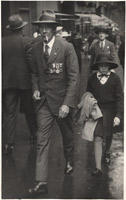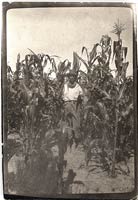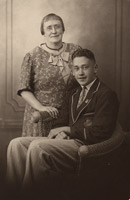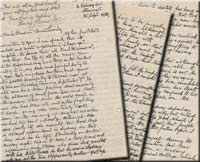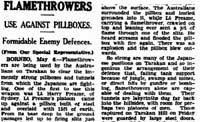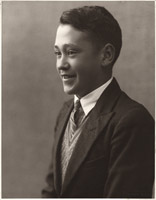WYKEHAM HENRY KOBA FREAME, DCMan ANZAC in the family
It seems that May disappeared from sight, at least from the electoral registers, from 1925 until 1931. It is maintained, in The Gallipoli Samurai, that her condition deteriorated to such an extent that she was admitted into a psychiatric institution, apparently not to be heard of again until she was seen by a young girl to step off a train, "... clutching a small suitcase after a puzzling absence of some years ... in late 1930 or early 1931". This statement appears to be based on an interview, more than 50 years later, with that same person who also asserted that she came to gain the confidence of May who shared with her the happenings of the missing years. Can this be true or could there be another explanation? Perhaps, with her disturbed state of mind she merely withdrew from taking any part in the life of the community, becoming increasingly reclusive, much as she had when visiting her family the previous year. If not ... where was she? Where did she go?
What is in no way questioned is the fact that Josephine and Henry had a daughter, named Josephine Grace, born in October 1927. It seems that May appeared on the scene again, when Grace was about 3 years old ... and that there was tension between the three adults in the household. However, May must have been sufficently recovered to involve herself in community life again, as she did. In 1934 Josephine made the decision to leave the Freame household and went to live in Sydney. We read that her son John had also left Kentucky to enrol for study at Hawkesbury Agricultural College. After marrying a girl from Kentucky, he would also settle in Sydney in 1935.
Our own last surviving letter from May, to Frank & Lizzie, her Failsworth family, was sent just before Christmas 1938. She writes of no longer having help in the house, "... I'm glad to say say I have been able to manage it so far with a little assistance from Henry when he has not been too busy and I much prefer having my home my own again ..." amongst other things she goes on to write of family affairs, the need for rain and hope of a good crop of fruit, of family affairs both in Australia and back in England; of Harry's final year in school and his hopes of good exam results and a job in Sydney.
It is at this point that facts become thin, and conjecture often creative. The general picture seems to be that Henry, fluent in Japanese, with influential military and government contacts, family and business interests in Japan and diverse Japanese contacts in Sydney, had for some time been quietly and secretly gathering information and opinions from these sources and passing them on to Australian Military Intelligence Services. If true, it's not clearly known how formalised this was or for how long he had been doing it. In his book, Brian Tate presents very compelling evidence to support the theory that Henry was involved in espionage. Looking at our own known facts on which to base our assumptions, in December 1939 Henry again writes to Frank and Lizzie in Failsworth telling them that Harry has returned home, and Grace is ready to leave for school in Armidale. However, other plans have changed in that Harry, "... has given up his college and work in Sydney to take my place at home since I have accepted the call from the military ..." What this would entail he doesn't say ... but moves to lodgings in Sydney. The next pointer to his possibly being employed in clandestine activities is a letter dated 3rd April 1940, which is filed with his attestation papers. It requests the Service Record of 'Sergeant Harry Freame' and any other details "... relating to his personal integrity." Was he being considered for more sensitive, secret activities? Taken with other memos and letters, it's thought more than likely. In August 1940, in Sydney, Henry married a divorcee, with a son and daughter, Mrs. Harriet Elizabeth Brainwood. Harriet was a nurse and her maiden name was Channon. The story of what followed is generally known but here it is in Harry's own words, taken from a letter dated January 1945, writing of the circumstances of his father's death,
From other sources we know that Henry was having tests in hospital in Tokyo, in 1941 and that at the end of January he was found one morning to be barely able to speak. He remained in hospital for further medical investigation but no plausible cause could be found. He was transferred to a ship in mid March for the return voyage to Australia. Once home, but hardly able to speak, he managed to make his family understand that his injury was the result of an attempt at murder, by garrotting. He died only days later. There was no autopsy carried out. The official version was that the cause of death was cancer; the throat injury was brushed aside ... In 1941, although Japan had expressed her friendship towards the Axis Powers, she had still not entered the war, so we can assume that the Australian Government wouldn't be wanting anything 'to rock the boat' of diplomatic relations. Initiated by Henry's widow, Harriet, what ensued was an exchange of letters, claims and counter claims that Henry had died in the service of his country, that the Intelligence Service hadn't done enough to protect one of their own; that there had been a diplomatic but badly handled cover-up; that various medical experts contradicted one another and finally, but crucially, that no autopsy had been carried out despite the fact that no cause for the injuries to his throat could be found. The only explanation fitting the damage appeared to be an attempt at garroting. Henry's widow had demanded answers, but her requests were brushed aside and she received no satisfactory explanations. She was, however, awarded a paltry one-off payment ... was this just an attempt to keep her quiet? Henry was buried in Macquarie Park, Sydney, on the 29 May 1941. The mourners included a couple of government and military represenatives, amongst the colleagues, friends and family gathered there. POSTSCRIPT My over-riding emotion, after doing the research and writing this little story, is one of melancholy ... the lives blighted, damaged, lost or wasted; the victims of circumstances often beyond their control. It would have been good to round off the story on a 'happy ever after note', at least for young Harry and Grace, but it wasn't to be. In Harry's letter of January 1945, he goes on to write of what he did following Henry's death,
So Harry achieved, in the second war, that which was denied to his father in the first ... he gained a commission. However, Harry's optimism and hopes for a speedy end to the war wouldn't be fulfilled - he in his turn would be murdered, in a hospital ward, by a Japanese soldier who infiltrated the field hospital in which Harry was receiving treatment for an abscess under a tooth. He stayed the night and, as he slept, a soldier crept in and threw a fused shell under his bed. He was killed instantly, on Europe's V.E. Day.
From a family point of view, I would like to have known more of Grace, and have the hope that she lived a life that fulfilled her own hopes and found some happiness. Her world seems to have been turned upside down on more than one occasion and to lose the two most important people in her life, her father and her brother, both in horrific circumstances, within the space of three years, and before she was even 20 years old, must have been traumatic. I wonder ... did she find her mother, and half-brother John again? I imagine she might have felt that May was at the root of many of the things that went wrong in her life ... but life is never that simple; never that clear cut; never black and white. Knowing of May from family stories and reading her early letters she was the much loved younger sister of her brothers and the youngest child of her doting parents. Childbirth and the aftermath of depression appear to have robbed her of all her sureties in life, leaving her vulnerable and desperate. Coming home to her mother didn't solve the problems ... going back to Australia didn't either. Henry and May both became victims of cruel chance and poor Harry became collateral damage. Grace would be the next victim of their own unhappiness. Loved by her father and brother ... what were Grace's and May's true feelings towards each other? What were the feelings of Grace and Josephine for each other? And again, I wonder about Henry's sister Grace and his niece Cecelia ... did they survive the war and the atomic bombs that fell on Japan? How did they remember Henry? So many questions still unanswered ... after this passage of time, I know there are unlkely to be any answers but there is always hope ...
|
Sources: 1. Family letters, photos and documents. |
Page 6 |
